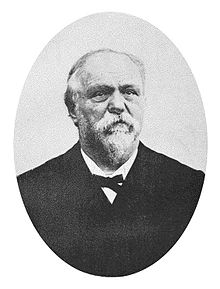
Back جورج سيرويل Arabic جورج سيرويل ARZ Жорж Сорел Bulgarian জর্জ সোরেল Bengali/Bangla Georges Sorel Catalan Georges Sorel Czech Georges Sorel Welsh Georges Sorel German Georges Sorel Esperanto Georges Sorel Spanish
Georges Sorel | |
|---|---|
 Georges Sorel | |
| Born | Georges Eugène Sorel 2 November 1847 |
| Died | 29 August 1922 (aged 74) |
| Alma mater | École Polytechnique |
| Notable work | Reflections on Violence (1908) |
| Era | Modern philosophy |
| Region | Western philosophy |
| School | |
Main interests | |
Notable ideas | |
| Part of a series on |
| Syndicalism |
|---|
 |
Georges Eugène Sorel (/səˈrɛl/; French: [ʒɔʁʒ øʒɛn sɔʁɛl]; 2 November 1847 – 29 August 1922) was a French social thinker, political theorist, historian, and later journalist. He has inspired theories and movements grouped under the name of Sorelianism.[2][3] His social and political philosophy owed much to his reading of Proudhon, Karl Marx, Giambattista Vico, Henri Bergson[4][5] (whose lectures at the Collège de France he attended), and later William James. His notion of the power of myth in collective agency inspired socialists, anarchists, Marxists, and fascists.[6] Together with his defense of violence, the power of myth is the contribution for which he is most often remembered.[7]
Politically he evolved from his early liberal-conservative positions towards Marxism, social-democracy, and eventually syndicalism. Between 1909 and 1910 he was marginally involved with Charles Maurras' Action Française, and between 1911 and 1913 he wrote for the politically transversal L'Indépendance, established together with Édouard Berth – one of Sorel's main disciples – and Georges Valois, closer to Maurrassian circles. After a long silence during the war, Sorel came out in favour of Lenin and moved towards Bolshevist positions until his death in 1922.
His legacy in the interwar period embraced both ends of the political spectrum, as many former syndicalists welcomed the emerging fascism. According to historian Zeev Sternhell, Sorel's revision of Marxism broke the necessity of the link between revolution and working class, opening up the possibility of replacing the proletariat with the national community.[6]
- ^ Vuka, Denis (2017). "The Visual Construction of the Myth of the Albanian National Leader". Journal of Educational Media, Memory, and Society. 9 (2): 69–85. doi:10.3167/jemms.2017.090204. ISSN 2041-6938. JSTOR 48561647.
Georges Sorel expands on these ideas by giving myth a political meaning, and sums up the essential idea of myth as the expression of a will to act
- ^ Guy-Grand, Georges (1911). "M. Georges Sorel et le 'Matérialisme Historique'". In: La Philosophie Syndicaliste. Paris: Bernard Grasset, pp. 7–33.
- ^ Lewis, Arthur D. (1912). "Monsieur Georges Sorel and his Ideas". In: Syndicalism and the General Strike. London: T. Fisher Unwin, pp. 37–94.
- ^ Lovejoy, Arthur O. (1913). "The Practical Tendencies of Bergsonism, II". International Journal of Ethics, Vol. 23, No. 4, pp. 419–443.
- ^ Hamilton, James Jay (1973). "Georges Sorel and the Inconsistencies of a Bergsonian Marxism", Political Theory, Vol. 1, No. 3, pp. 329–340.
- ^ a b Sternhell, Zeev, Mario Sznajder, Maia Ashéri (1994). "Georges Sorel and the Antimaterialist Revision of Marxism". In: The Birth of Fascist Ideology: From Cultural Rebellion to Political Revolution. Princeton University Press ISBN 0-691-03289-0
- ^ See, for instance, Kract, Klaus Gross (2008). "Georges Sorel und der Mythos der Gewalt". Zeithistorische Forschungen / Studies in Contemporary History, No. 1.